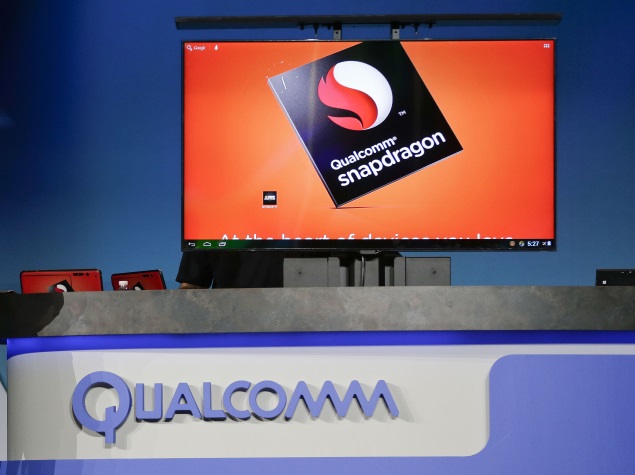- Home
- Telecom
- Telecom Features
- For Qualcomm, China Antitrust Settlement May Be Just the Beginning
For Qualcomm, China Antitrust Settlement May Be Just the Beginning

China's National Development and Reform Commission (NDRC) is moving to wrap up its 13-month investigation into the U.S. chipmaker as soon as possible, the regulator said in a statement on Friday, bringing to an end one of the most high profile of a slew of such investigations by Beijing into western firms.
Any deal is likely to include a record-breaking fine, as well as changes to how Qualcomm licenses its technology to handset makers in China, according to industry sources and local press reports.
That could weaken the firm's prized technology-licensing business across the global smartphone industry by increasing pressure from regulators in other countries. Antitrust probes in Europe and by the U.S. Federal Trade Commission (FTC) may be related to China's investigation, Qualcomm has said.
"It's not an overstatement to say they're under attack," said Thomas Cotter, a patent expert and professor at the University of Minnesota Law School. "Nobody knows how it will play out but the fact that there is an FTC investigation tells you something."
Qualcomm declined to comment.
Royalty changes
Qualcomm is the top patent holder for cellphone technology, including many that form industry standards like CDMA and LTE. Charging royalties based on the cellphones' selling prices, even those made with competitors' chips, provided more than half of its $8 billion net income in 2014.
As growth tapers in developed markets, the smartphone industry has turned to China, where the rollout of LTE technology is driving demand, and where the majority of the world's smartphones are also manufactured.
The NDRC, one of China's antitrust regulators, has said it suspects Qualcomm of overcharging and abusing its market position in wireless communication standards.
Qualcomm is expected by industry sources to agree to changes in how it charges royalties on cellphones sold in China, which will hurt its bottom line in its fastest-growing and most significant market.
Qualcomm earned about half of its global revenue of $26.5 billion (roughly Rs. 1,68,614 crores) in China for the fiscal year ended Sept. 28.
An agreement to lower royalty rates charged by Qualcomm on phones sold in China could affect its contractual relationships not just with local manufacturers such as Huawei, Lenovo, ZTE and Xiaomi Inc, but also with bigger global players that make and sell phones in China, such as Apple Inc. and Samsung Electronics, said patent lawyers consulted by Reuters.
At a meeting with analysts in November, Qualcomm President Derek Aberle did not directly answer a question about when the chipmaker's largest licensees' contracts would be due for renegotiation, or how those renegotiations would be affected by potential concessions Qualcomm could make in China.
"If Qualcomm comes to an agreement with China's government to materially reduce its royalty rates, then what happens with their agreements with LG, Samsung and Apple?" said Ascendiant Capital analyst Cody Acree. "It becomes a snowball that's really hard to see the end to."
ON THE BACK FOOT
The China probe is the latest antitrust investigation faced by Qualcomm, which was hit with a $20 million (roughly Rs. 127 crores) fine in South Korea in 2009 and was forced to renegotiate licensing agreements with Nokia and others by the European Commission in 2007.
Recent decisions by Supreme Court judges making it harder to enforce software patents, as well as the possibility of a renewed push in Washington for patent reform, now have the San Diego company on the defensive at home, some patent experts believe.
The FTC's probe concerns patents on technology used in industry standards and might require Qualcomm to change its licensing practices, according to a company filing.
"Qualcomm has more problems than just in China," said Donald Merino, who advises companies on patents in Asia. "They have a problem in the US as well because the U.S. is devaluing the patent system."
© Thomson Reuters 2014
Get your daily dose of tech news, reviews, and insights, in under 80 characters on Gadgets 360 Turbo. Connect with fellow tech lovers on our Forum. Follow us on X, Facebook, WhatsApp, Threads and Google News for instant updates. Catch all the action on our YouTube channel.
Related Stories
- Samsung Galaxy Unpacked 2026
- iPhone 17 Pro Max
- ChatGPT
- iOS 26
- Laptop Under 50000
- Smartwatch Under 10000
- Apple Vision Pro
- Oneplus 12
- OnePlus Nord CE 3 Lite 5G
- iPhone 13
- Xiaomi 14 Pro
- Oppo Find N3
- Tecno Spark Go (2023)
- Realme V30
- Best Phones Under 25000
- Samsung Galaxy S24 Series
- Cryptocurrency
- iQoo 12
- Samsung Galaxy S24 Ultra
- Giottus
- Samsung Galaxy Z Flip 5
- Apple 'Scary Fast'
- Housefull 5
- GoPro Hero 12 Black Review
- Invincible Season 2
- JioGlass
- HD Ready TV
- Latest Mobile Phones
- Compare Phones
- Tecno Pova Curve 2 5G
- Lava Yuva Star 3
- Honor X6d
- OPPO K14x 5G
- Samsung Galaxy F70e 5G
- iQOO 15 Ultra
- OPPO A6v 5G
- OPPO A6i+ 5G
- Asus Vivobook 16 (M1605NAQ)
- Asus Vivobook 15 (2026)
- Brave Ark 2-in-1
- Black Shark Gaming Tablet
- boAt Chrome Iris
- HMD Watch P1
- Haier H5E Series
- Acerpure Nitro Z Series 100-inch QLED TV
- Asus ROG Ally
- Nintendo Switch Lite
- Haier 1.6 Ton 5 Star Inverter Split AC (HSU19G-MZAID5BN-INV)
- Haier 1.6 Ton 5 Star Inverter Split AC (HSU19G-MZAIM5BN-INV)







![[Partner Content] OPPO Reno15 Series: AI Portrait Camera, Popout and First Compact Reno](https://www.gadgets360.com/static/mobile/images/spacer.png)









